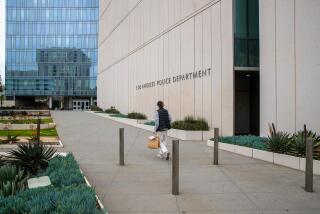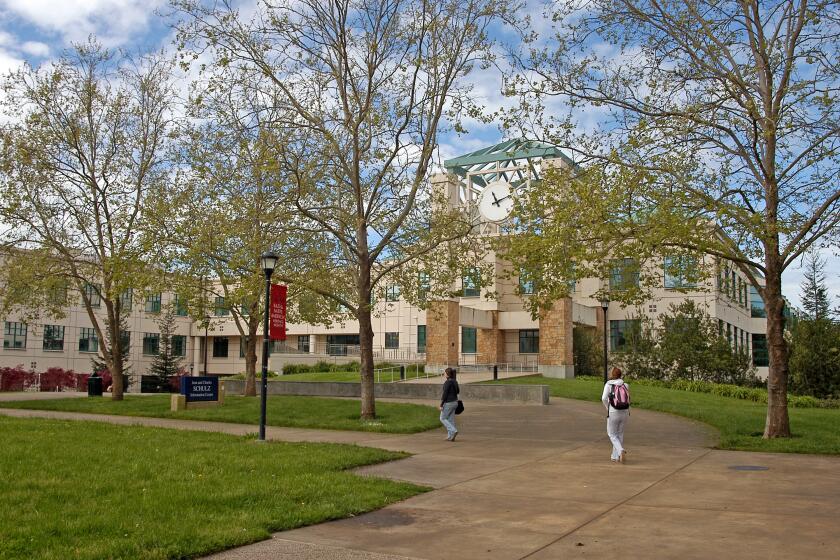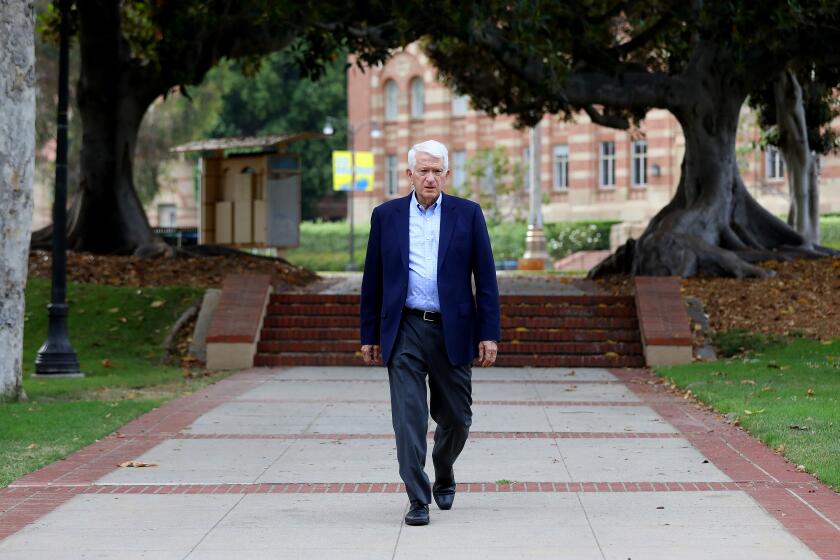2,000 Protest Contraceptive Plan for Students
More than 2,000 persons marched through Pacoima on Monday night in a protest organized by members of a Roman Catholic parish against establishment of a health clinic authorized to distribute contraceptives at San Fernando High School.
Carrying lighted candles and signs in English and Spanish, the demonstrators, many of them teen-agers and small children, walked a half mile from the Guardian Angel Catholic Church to the headquarters of the Northeast Valley Health Corp., where they held a rally.
The Los Angeles Board of Education chose the corporation to operate the controversial high school clinic, one of three planned in the school district.
Only students who have obtained written parental consent will be allowed to use the clinics.
“These people think giving kids more pills, more contraceptives, will decrease the pregnancy rate,” Gerardo Ascencio told the protesters when they gathered in the firm’s parking lot.
‘Not the Solution’
Teen-age pregnancy “is a problem and we are concerned about it,” he said, “but this is not the solution. We think this is an easy way to get out of the problem. We do not want the clinic.”
Monday’s march was the second demonstration this month sponsored by Guardian Angel parishioners and is one of a series of grass-roots protests against the clinic by predominantly Latino Roman Catholic parishes in the northeast Valley. About 83% of the students at San Fernando High School are Latino; 13% are black; 4% are white.
At Mary Immaculate Catholic Church in Pacoima on Sunday, parishioners signed anti-clinic petitions to be mailed to San Fernando High School administrators.
Last month, Father David Ullrich of Santa Rosa Catholic Church in San Fernando wrote a pastoral letter in the church bulletin, saying it was clear that “the school board’s principal concern is not health.
“If it were, then the board would have proposed health care in elementary and junior high schools,” he wrote. “The board’s real concern is to control teen-age pregnancy by the distribution of birth control devices to high school students.”
Stance Remains Firm
Despite the protests, the school board members who authored the proposal--Roberta Weintraub and Jackie Goldberg--remained firm.
“They can demonstrate all they want, but San Fernando High is going to get a health clinic,” Weintraub, who represents the East Valley, said in a telephone interview Monday.
“I think it’s reprehensible for anyone to attempt to deny the young people of San Fernando the type of medical services that will be provided at the clinic,” she said.
“I’m sorry some people are upset,” said Goldberg, but added that she expected that “people in San Fernando would kick up a fuss.
“We just have to weather the storm,” Goldberg said. “The vast majority of people who understand the purpose of the clinics are supportive of them. The protesters are a minority who don’t understand the clinics.”
The school board formally approved establishment of the clinics in August despite protests from several groups, including the Roman Catholic Archdiocese of Los Angeles, that the clinics would promote promiscuity among teen-agers and undermine the authority of parents.
When opened, the clinics will offer a wide range of services including general physical examinations, treatment of minor illnesses and injuries, weight control, and mental health counseling. Additionally, they will offer birth-control counseling, contraceptives, pregnancy testing, prenatal care and screening for sexually-transmitted diseases, including AIDS.
Abortions or abortion counseling will not be available at the clinics, according to a brochure recently published by the district. Students with questions about abortion will be advised to see their personal physicians or directed to “publicly available sources” such as “help-lines, public libraries or local public clinics,” according to the brochure.
San Fernando, along with Jordan High School in Watts and Los Angeles High School, were chosen for the initial clinics because of higher-than-average rates of pregnancy, infant mortality and sexually transmitted diseases among teen-agers in the neighborhoods surrounding the schools.
The district estimates that it will cost $600,000 a year to run each clinic. So far, the district has raised approximately $160,000 in private funding for the clinics. According to Weintraub, the three clinics are also among 30 finalists for funding by the Robert Wood Johnson Foundation of Princeton, N.J., a philanthropic organization that is the largest source of private funds for school-based clinics.
More to Read
Start your day right
Sign up for Essential California for news, features and recommendations from the L.A. Times and beyond in your inbox six days a week.
You may occasionally receive promotional content from the Los Angeles Times.






